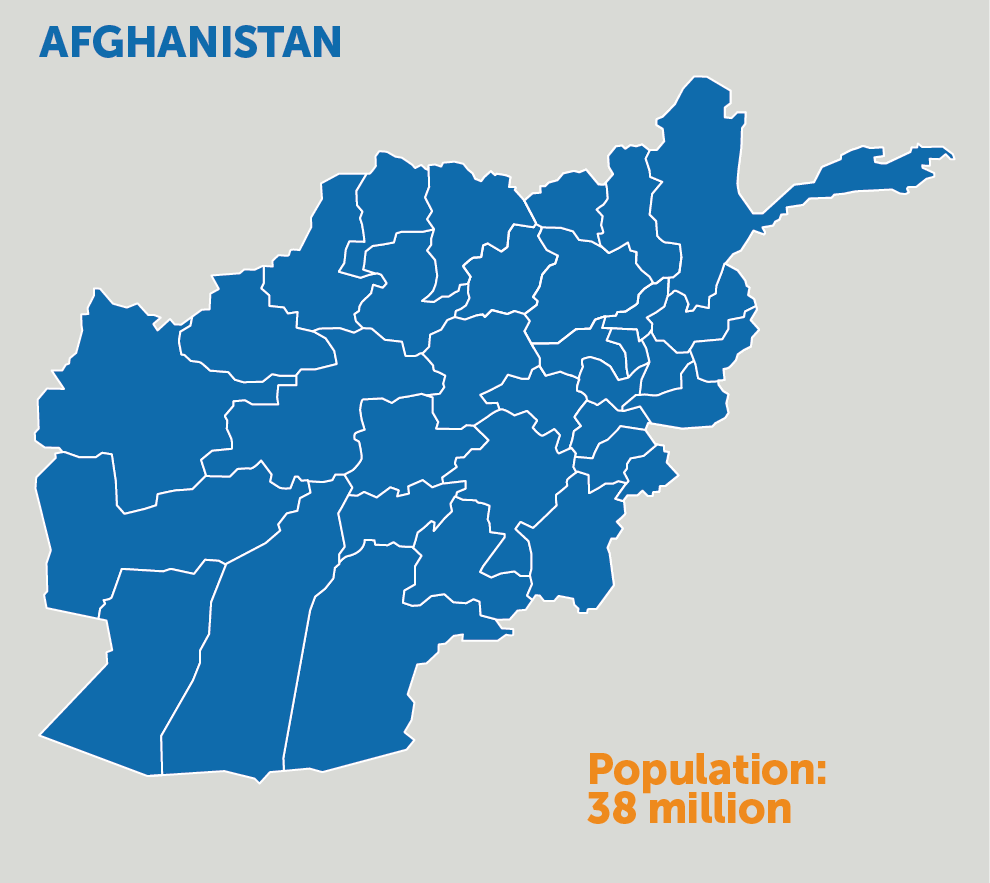Increasing Accountability and Performance: The Advantage of Digitized Systems
Transitioning from a paper-based to a digitized system follows the current trend of using advanced technology to track information on a timely basis and boost performance. In Afghanistan, health systems continue to be on the path to recovery following a 23-year conflict, which resulted in widespread displacement and destruction of infrastructure. The health sector’s current priorities are strengthening data collection and use, improving management decision-making and informing performance improvements.
Afghanistan’s Ministry of Public Health (MoPH), together with partners within the same sector, developed a Basic Package of Health Services (BPHS) that guides the implementation of Primary Health Care which the country’s EPI falls under. What followed was the contracting of national and international NGOs to deliver various health services across the country’s 31 provinces.
Each province is assigned BPHS and Government EPI supervisors to visit health facilities monthly and quarterly, respectively, and gather data that would be shared at both provincial and national level. However, even with this system, the flow of information continued to be problematic. In the case of EPI, there was uncertainty around whether supervisors were visiting health facilities every month. Supervisor data was collected on paper and often submitted late, making it difficult for senior level managers to use the data to manage performance in a timely or routine manner. These challenges ultimately led to MoPH’s decision to invest in improvements of EPI tracking systems.
Bahman Shahi is a country manager working with Acasus, one of the development firms contracted to support the initiative. Acasus undertook a diagnosis of Afghanistan’s EPI program and collected data from implementers at different hierarchical levels. The findings showed issues in the monitoring and oversight of EPI service delivery, affecting managers’ ability to address challenges at facility-level. This informed the development of a three-step strategy to improve supervision in health facilities and increase accountability and performance, which was piloted in five provinces.

First, a mobile application for supervisors was developed. This application is set to a local language and works both online and offline to collect data from health facilities, even where connectivity is low. Once data is entered into the app by supervisors, it is analyzed by the managers against the country’s EPI indicators. At the end of each month, National EPI in collaboration with Acasus disseminates visual data pack reports, providing managers with a simple but detailed overview of performance at provincial and facility levels, which are also used to guide the development of action plans. Bahman and team trained groups of up to ten government and BPHS supervisors per province to use the app to collect performance data from health facilities.
Additionally, supervisor data is transferred into performance management dashboards, providing managers with a deep analysis of the performance of each health facility in real-time. For example, this enables managers to immediately identify vaccine stock-outs, and to arrange for vaccines to be dispatched as needed.

Acasus’ third strategy involved developing new routines to use this data to manage performance and coaching people in their use. Quarterly review meetings were established at national level where performance of all provinces would be analyzed and reviewed against the EPI indicators. Beyond this, additional follow-up and feedback routines between national and provincial level teams were created to ensure progress against actions agreed during review meetings and to increase overall accountability for
performance. Since June 2019, Bahman and his team at Acasus have trained supervisors and managers at different levels who all have a role in the improvement of EPI tracking systems. Supervisors have been familiarized with the app, while provincial and national managers have been trained on how to use the data and conduct monthly performance reviews.
Working with set targets, there were noted improvements in the frequency of supervisions, which led to the scale up to a further 12 provinces in June 2020, accounting for ~70% of the Afghan population.
For provincial managers, tracking monthly performance has proved to be useful in real time assessments of improvements and declines per district. At quarterly review meetings, managers note what was working in other provinces and initiate similar steps of their own.
Quarterly review meetings were initially facilitated by the Acasus team but have since been taken over by the national EPI team and senior MoPH officials. Acasus still has a role in preparing reviews and simplifying the content for these meetings, however, due to COVID-19 restrictions, the meetings are no longer in-person but are facilitated online. This transition has been convenient for provincial managers, who used to have to commute over long distances to attend the sessions. During these reviews, effective performance is applauded, while in areas where coverage is low, performance improvement action plans are developed.
August 2020 to May 2021
The percentage of facilities that completed
required fixed sessions each month improved
from 78% to 94%
Outreach sessions performance improved from 66% in to 77% in March 2021
As a result of the approach, 70% of facilities are now supervised each month by BPHS supervisors. While no data exists on supervision frequency before the program began, according to anecdotal evidence, facilities were previously supervised just once every 3-6 months.
Elements of the approach are also being used to support the country’s COVID-19 vaccine rollout, while a pilot to extend the approach to other areas of primary health has also been launched.
Overall, this improved use of data, technology and routines to improve performance and feedback systems shows that when there are data-driven systems in place to hold people accountable, positive changes in performance can follow.

Bahman Shahi
This Bright Spot Story was nominated by Bahman Shahi, a Country Manager with Acasus based in Kabul, Afghanistan. Bahman shared this story to highlight how even in the context of challenges such as insecurity, sporadic internet access and intermittent electricity, technology can still play a vital role in health when curated right and driven by dedicated teams.


